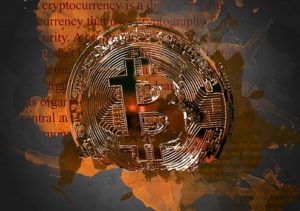by Anthony Signorelli, Part 1 of 2
 What does bitcoin mean for postcapitalism? If you take the statement below by Marc Andreesen at face value, it is enormously important.
What does bitcoin mean for postcapitalism? If you take the statement below by Marc Andreesen at face value, it is enormously important.
“Bitcoin gives us, for the first time, a way for one Internet user to transfer a unique piece of digital property to another Internet user, such that the transfer is guaranteed to be safe and secure, everyone knows that the transfer has taken place, and nobody can challenge the legitimacy of the transfer. The consequences of this breakthrough are hard to overstate.”
– Marc Andreessen
If I understand it correctly, the innovation isn’t exactly Bitcoin, but rather, the blockchain technology that underlies it. Why? Because Andreessen’s description outlines a way to track, control, and own digits. The theory of a postcapitalist future rests, in part, on the notion that digits can’t be controlled, and so they are always undermining the principle of private property. Andreessen’s description makes it sound as if bitcoin enables the private, anonymous ownership of digits. (For a primer on bitcoin and blockchain, I suggest this article.
Think of it this way: If a bitcoin can be tracked through a blockchain system that allows people to own them and effectively limits the production of new bitcoin, why couldn’t the same technology be used to limit the production and reproduction of digital products like ebooks, plans, music CDs, and so on? It seems that the only difference is that a bitcoin is a small set of digits, whereas a book, music, or video is a large set. So far, scale has been an ineffective defense against digital innovation and adoption—I don’t see that as stopping the eventual deployment.
However, there are many challenges that suggest the initial capability to sustain private property through blockchain may not be as good as first considered.
First, nothing in this system seems to affect the marginal cost of reproduction. The digital product itself still offers no floor on price—at least not intrinsically. One can imagine that if a system needed to be maintained for blockchain to work, costs might be associated with that and then allocated to the alignment of the product with the system. If you wanted to “print” 1,000 copies of a blockchained ebook, perhaps a cost could be allocated. But even those costs would plummet over time, and eventually disappear. With no floor in cost, there is no floor in prices on an open market. Prices would still collapse.
Second, it seems that for blockchain to work and protect security and participants, it can’t be controlled by a single entity. Bitcoin, for example, has nodes in its network and some of them started to grow to take over enormous amounts of the transactional work—some dominating at 20% or more of the calculations—and that makes the network, and your bitcoin, insecure. The distributed nature of the blockchain accounts for its security. This would seem to suggest that it is impossible for Amazon to utilize blockchain to control ebook or music distribution, but no one really knows.
Third, the limit of supply through blockchain may or may not actually turn out to be possible without multiple creators or “miners” in Bitcoin terminology. If true, the creation of those multiple miners would seem to suggest that infinite supply in fact exists, and cannot be controlled after all.
There’s a lot more to learn here. Next post, I want to talk about some of the postcapitalist attributes of bitcoin and blockchain, as I understand them.